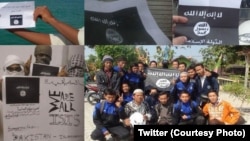Analysts and security experts are expressing mounting fears that the Islamic State in Iraq and the Levant (ISIL) may be gaining international support following the launch of its “One Billion Muslims” campaign last month. Some are especially troubled that some of that support is coming from Muslims in the West.
Several photographs posted onto social media sites show ISIL supporters posing in front of identifiable landmarks – including London’s Big Ben and Rome’s Colloseum.
One image posted shows four people, their faces blurred, holding up ISIL banners in a Dutch city decorated with flags to celebrate The Netherlands’ participation in the 2014 World Cup in Brazil.
Followers from Britain, Germany, Spain, Austria and other European and non-European countries have posted photographs online, increasing worries that the al-Qaida breakaway group could draw on its foreign followers to help plan and execute terrorist attacks in the West.
ISIL, which recently began calling itself the Islamic State (IS), launched its “One Billion Muslims” campaign June 14. The group urged sympathizers worldwide to show solidarity with the organization and created a special Twitter hashtag for the purpose.
“Having taken control of large areas of Iraq, IS is now enjoying increasing shows of solidarity from the Middle East and from across the Muslim world – and also from Western countries,” the Middle East Media and Research Institute (MEMRI), a Washington D.C.-based non-profit which monitors and translates jihadist media, said in a recent report.
Western support is “crucial to the group’s propaganda efforts,” MEMRI said.
“…in addition to swelling the ranks of its fighters and bringing in funds and logistical support, it increases its prestige and deters its rivals,” said the group.
Airport security tightening
Al-Qaida leaders disowned ISIL last winter after a dispute over jihadist strategy. Western security agencies are fearful al-Qaida may try to unleash a terror spectacular of its own as a way to grab back the initiative and attention from its one-time affiliate, whose leaders have declared an Islamic “caliphate” and are demanding allegiance from jihadists worldwide.
European governments have ramped up airport security in response to U.S. concerns that al-Qaida suicide bombers could be planning attacks on American-bound commercial flights, possibly using a new generation of non-metallic explosives that current airport security equipment may not be able to detect.
International airports in the U.K. introduced new anti-terror measures Thursday. Transatlantic passengers are undergoing greater scrutiny, often accompanied by rigorous body searches. Airport agents are swabbing all electronic items – including cell phones, computers, cameras and even electric toothbrushes – for signs of explosive residue and requiring owners to switch the equipment on and off, passengers told the British press.
Bringing jihad back home?
Western security has been focused on the threat from Jabhat al-Nusra, al-Qaida’s affiliate in Syria, which U.S. and European officials say is collaborating with al-Qaida in the Arabian Peninsula (AQAP). A Sunni jihadist group based in Yemen and Saudi Arabia, AQAP has persisted in attempts to attack U.S.-bound passenger jets.
But former and current U.S. security officials say the longer-term worry is ISIL, which has managed to attract the bulk of foreigners recruited by jihadists to fight in Syria and Iraq. And they cite growing fears of blowback, worrying that returning foreign fighters will be used to stage attacks in their home countries.
Some of those posting solidarity with ISIL now could be former fighters, say intelligence officials, or people they have helped to recruit.
Most of the Western Muslims who have gone to fight in Syria have not joined moderate rebel militias but rather foreign-dominated, radical Islamic militias, including ISIL, said retired FBI agent Martin Reardon, a former chief of the bureau’s Terrorist Screening Operations Center.
“These guys knew exactly who they were joining when they signed up with IS or Jabhat al-Nusra,” Reardon said. “If only a few of them morph from being a foreign fighter into a terrorist, that will be a big challenge.”
Reardon said jihadist groups are always on the lookout for ways to circumvent Western defenses and launch attacks in America or Europe. And he harbors no doubt there will be consequences for America and Europe.
“You shouldn’t underestimate the threat,” he said.
U.S. anxiety about a blowback was heightened May 25, when Florida-born Moner Mohammad Abusalha became the first known American fighter in Syria to undertake a suicide bombing mission against Syrian government troops.
Adding to concerns, a former foreign fighter, 29-year-old French-Algerian Mehdi Nemmouche, has been accused by Belgian authorities of a May 24 shooting in the Brussels Jewish Museum in which four people died.




